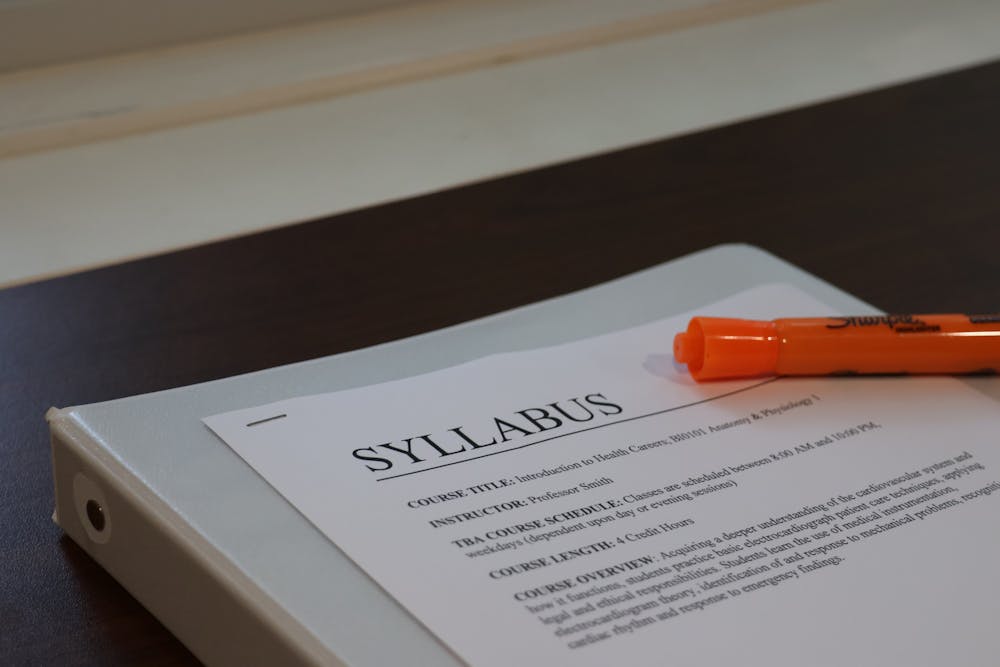In the first week of classes at Elon University, School of Law professor Sara Ochs uploads syllabi for her classes to Moodle.
Historically, students have relied on syllabuses for assignments, readings, due dates and more. But with the introduction of coursework technology such as Moodle, where students can check due dates virtually, Ochs said she mostly relies on trusting her students to read the syllabus.
However, Ochs said a college syllabus is still necessary and that it can work alongside technology.
“I love the syllabus. I think it's a great place for students to find all of the general rules about the class in one spot,” Ochs said. “I'm a big proponent of putting that syllabus on my Moodle page, very front and center, so that is the first thing students see when they log on to the page.”
Ochs is teaching an introduction to legal writing class, which is mandatory for first year law students. When drafting her syllabus with other law professors, she includes a course overview, a list of learning objectives, policies regarding diversity and professionalism, her grading policy and a course schedule with included deadlines.
Interim Director of the Center for the Advancement of Teaching and Learning Olivia Choplin said a syllabus can set the tone for the class.
“For me, the syllabus is a way of getting students excited about a course, interested in the course, engaged with the course and for helping them understand best how they can navigate and the course and be successful in it,” Choplin said.
Despite Ochs usually relying on trust, she said she started implementing syllabus quizzes this year to get students to read the syllabus. Elon senior Heath Foster said he doesn’t read the whole syllabus if there is not a quiz on it.
As a marketing and media analytics double major, Foster said he tends to skim over the routine university policies and learning objectives to focus on the course schedule and grading scale.
"I'll skip over a lot of the Honor Code section and all of those other resources that they list just because I've seen it in every class since I started here,” Foster said.
Choplin said she uses a program called Hypothesis Document, a social annotation application, to encourage students to read the syllabus for her French classes.
“What I asked students to do before the second day of class was to go in to read the syllabus and add into comments about things that they were excited about, things that they were nervous about, things that they were curious about, or to read the syllabus and add to annotations to tell me what their reactions were to it,” Choplin said.
Elon junior Sam Perry, a chemistry major, also said she skims sections in favor of the grading and course schedule. In addition, Perry said she notices that sometimes syllabus can mislead a student into thinking a professor is strict when they’re not.
“Professors can kind of scare you with how strict they are on their syllabus,” Perry said, “and then when you actually take the class, they're a lot nicer.”
Since Ochs started teaching six years ago, she has observed that college syllabuses have gotten longer, with more added policies from the university and the professors themselves.
“I try to include things that address issues that I either see come up in the classroom during the previous years or issues that are kind of more important to society generally,” Ochs said. “I’ve adapted my professionalism policy over the years. I’ve created a new lengthier diversity policy that makes it very clear to students how I expect them to approach diversity and the respect that they bring to others’ opinions in the classroom.”
Foster said while he likes elements of the syllabus like the course schedule, if he could recommend any changes to college syllabuses, he would want them to be shorter.
“Make it more succinct,” Foster said. “I think a lot of them get dragged out really long, but keep the info you need and get rid of the stuff that can easily be found elsewhere.”
The Center for the Advancement of Teaching and Learning hosts workshops for professors on how to make their syllabi more accessible for students, according to Choplin.
“The main aspect of it is that helping students understand policies, some of which are dictated by the university but many are which are individuals or professors around what students can expect from the course and what they should bring to the course,” Choplin said. “We try to help folks understand how they can make their syllabus more inclusive and welcoming to students so that they see it as a document that makes their professor someone who is approachable and willing to help them learn.”
The purpose of the college syllabus is not only to communicate class expectations all in one place but to serve as a sort of contract between the student and professor that’s frequently updated, according to Ochs. To her, getting rid of that would get rid of the whole purpose of going through law school — or any school.
“We emphasize rules so much in law school and the importance of reading and the importance of making sure you're following rules,” Ochs said. “So I want the syllabus to be as professional as possible and really lay out what you need to do.”
Choplin said no matter what the document is called, the important thing is conveying important information to students.
“A printed out version of it isn't necessary, but a document of some kind that students can reference throughout the course to understand what the expectations are and they can find the useful information that they need,” Choplin said. “It's not the document called syllabus that is the important thing. It is the communication of very important information to your students in a way that is digestible and meaningful for them.”


